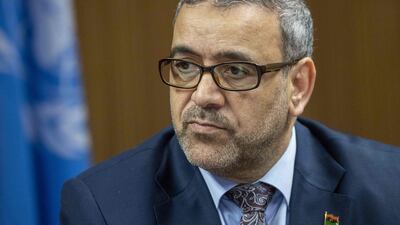Diplomats, including the new UN envoy to Libya, are pushing to accelerate plans to hold overdue elections.
Tripoli-based Khaled Al Mishri, who heads the High Council of State, met US Special Envoy to Libya Richard Norland, and charge d'affaires of his country's embassy, Leslie Ordman, in separate meetings.
Mr Al Mishri also met France's Special Envoy to Libya, Paul Soler, and French ambassador to Libya, Mustafa Maharaj. The two meetings dealt with the initiative announced by UN envoy to LIbya Abdoulaye Bathily last month on launching an election panel to organise presidential and legislative polls this year.
But his criticism of the North African country's two houses of parliament for failing to agree on a legal basis for elections has sparked a backlash that threatens to derail Mr Bathily's plans.
The pushback was predictable, said Khaled Al Montasser, a professor of international relations at the University of Tripoli, because elections could result in members of both chambers potentially losing their seats and privileges.
Despite the rivalry between them, both view the UN initiative as "interference in their sovereign decision-making power and an attempt to impose international will on Libyans", Mr Montasser told AFP.
Libya has endured more than a decade of stop-start conflict since the 2011 revolt that toppled dictator Muammar Qaddafi, with a myriad rival militias, foreign powers and governments vying for influence.
The country is split between a supposedly interim government in the western capital, Tripoli, and another in the east nominally backed by military chief Khalifa Haftar.
While most observers believe Libyans overwhelmingly support elections, bitter wrangling over the legal basis for holding them has been a sticking point since the last major battle between Mr Haftar and western Libyan forces in 2020.
Last month, the eastern-based House of Representatives passed an amendment to the country's Constitutional Declaration — an interim constitution — which it said would provide a legal basis for elections.
Mr Bathily, who was appointed as head of the UN's Libya mission Unsmil in October, said the amendment was controversial among Libyans and lacked clarity of key issues, such as who may stand in presidential polls.

He also noted it had not been endorsed by the High Council of State, the Tripoli-based upper house of parliament.
The House in turn accused Mr Bathily of "double standards" and "lacking impartiality".
The US embassy last week called on "key Libyan leaders to approach the plan in a constructive spirit", saying in an online post the UN proposal would "build on progress made between" the two chambers "on the legal basis for elections".
Britain also said it supported the plan.
"Libyans deserve certainty and faith in their institutions," its mission at the UN in New York tweeted shortly after Mr Bathily had spoken at the Security Council.
"Conditions for elections must be agreed by all and the results respected."

